Alabama Huntsville 'locked and loaded' to return but needs a conference
Only NCAA D-I men's team in southeast U.S. has funding, 'passionate hockey fanbase'
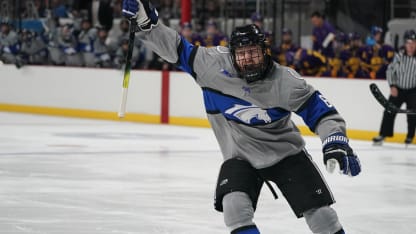
"It's all we need, a conference," Sheldon Wolitski said. "We're funded. We're locked and loaded, ready to go. If a new conference forms, we'll be submitting our application to get reinstated."
UAH last played in the 2020-21 season as a member of the Western Collegiate Hockey Association, which it had joined in 2013. But the WCHA dissolved July 1, 2021, when seven schools left for a reformed Central Collegiate Hockey Association for 2021-22.
Wolitski is founder and chairman of The Select Group. He and Taso Sofikitis, CEO and chairman of Maynards Group of Companies and the chairman of Hobie Cat, attended UAH from 1992-96 and were UAH hockey teammates in 1995-96.
They are teammates again as a substantial part of the $17 million in commitments identified in a fundraising effort that began in May 2020, when the program, which produced Minnesota Wild goalie Cam Talbot and Edmonton Oilers coach Jay Woodcroft, was slated to be eliminated for budgetary reasons due to the coronavirus pandemic.
Talbot also was part of that effort, and Wolitski and Sofikitis are certain the university is on board with the plan to preserve and enhance the program.
All of that, however, is contingent on UAH finding a new conference in which to play.
"From a financial perspective, the alumni are behind it," Sofikitis said. "Money is not an issue like it was in the past. We've already established a budget of $1.8 million [per season], between the alumni base and the university. And if we have to go up to grow it, we will. It's not an issue.
"We're not interested in having a mediocre program, particularly Sheldon and myself. When we do something, we do it to win. We're all about building a world-class organization where kids could get an education, build their hockey, be in a program that has an opportunity to win."
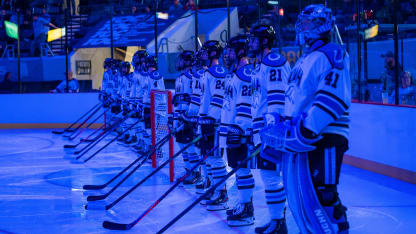
Woodcroft, a member of the UAH NCAA Division II national championship team in 1998, said it's crucial for college hockey to return to the non-traditional hockey market.
"An excellent academic university," Woodcroft said. "It was a passionate hockey fanbase both within the university and within the community and I had a wonderful four years where I grew not only as a hockey person but [in] life. It's where I matured and developed a lot of core principles and core beliefs.
"I think there's a lot of proud people that have been a part of that program, players, coaches, community boosters, all that kind of stuff, and I know that when there was a threat that the program might not last [in 2020], the outpouring of support from the hockey community to help raise the funds required, I thought, was unbelievable and it's spearheaded by some people trying to do a good thing, which is to make sure that Division I college hockey survives in the south."
While the group organizing for UAH to return continues to refine its preparedness and continues conversations behind the scenes, a new conference landscape is what Wolitski said he hopes to see. He noted that the University of Alaska Anchorage, the University of Alaska, Arizona State University, Long Island University and Lindenwood University, which begins Division I play next season, are independent programs. If UAH is thrown into the mix, it could form some type of critical mass to better the growth opportunities for college hockey in the United States.
"I think it's time to look at the overall strategy to grow the game because it's not a good thing if we've got all these D-I programs all playing independent," he said. "That could give us what we need to reinstate the [UAH] program, and once we reinstate it, we've got an action plan to sustain the program for the next 50 years, including building a rink on campus."
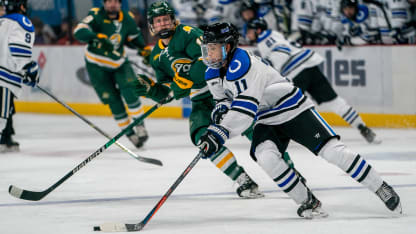
Those kinds of opportunities are everything for Steve Briere, a former UAH goalie and goaltending coach who hopes the program can be revived.
"I just think of how many kids there are out there playing hockey that every time we lose a program, how many kids that affects," said Briere, the goaltending coach for the Toronto Maple Leafs since 2015. "It's already hard enough to make it in hockey. We all know the path is a tough one, how small the number is of kids that make it. And not just talking NHL, just to make it to college.
"So every time a program dissolves, that's 26 spots for kids. And not just the chance to make it to the NHL, which is most people's dream, but the education, the camaraderie and friendships."
Briere's son, Cameron, is a forward with Tri-City of the United States Hockey League this season and the 16-year-old is hoping to play NCAA hockey. And it has caused Briere himself to reflect on the value of his playing days at UAH from 1997-2000 and his stint as goaltending coach in 2007-08.
He said he's kept in close contact with his UAH roommates, Woodcroft and Dwayne Blais, player development consultant for the Detroit Red Wings, on the current plight of the program.
"Those friendships last over the years and it's a sense of belonging so I think that the program leaving, for myself personally, it kind of erases a chapter in your life," Briere said. "Ten years down the road, if the program's been gone for 10 years, you'll tell people you played at [UAH], and everybody will be like, 'Where?' They say that anyway even though the program was there. It kind of erases a part of your past.
"You just hate to see it just because of the lost opportunities for kids to keep playing hockey. And Jay, Dwayne, myself, we got to make a career out of hockey. It started from being able to go to UAH and continue our hockey. I don't think anybody wants to see that program fold and we owe a lot to that program for allowing us to continue to chase our dream."
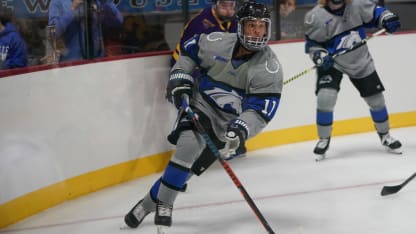
The UAH hockey program was born in 1979 as a club sport and was a three-time national champion. It moved up NCAA Division II and won the national championship in 1996 and 1998. It moved to Division I in 1998 and made two NCAA Tournament appearances, in 2007 and 2010.
The program's survival will matter in his hometown, said Washington Capitals forward Nic Dowd, who was born and raised in Huntsville.
Dowd, now in his seventh NHL season, played four seasons at St. Cloud State University but said his skill development and passion for the game began in Huntsville rinks.
"I definitely believe it's a hockey community," he said. "A really good youth program growing up. In the same arena they've had the Huntsville Channel Cats (1995-2004 in three different minor leagues) and now it's the Huntsville Havoc (Southern Professional Hockey League, since 2004). There's pro hockey there and I'd definitely say the Havoc run a lot of camps for kids and the UAH players and staff] have run a lot of camps for kids and I grew up going to every single one of those camps."
Dowd also credited Huntsville native
[Jared Ross
, who played at UAH from 2001-05 and 13 seasons of pro hockey, including 13 games for the Philadelphia Flyers from 2008-10.
"He's still running what they call Roscoe's Games once a week," Dowd said. "My older brother, Josh, is a goalie there and he plays in Roscoe's Games as much as possible. My family is all still there and I'm bumping into those guys all the time when I'm back."
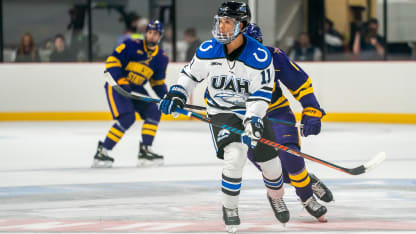
For all the hockey activity and enthusiasm that remains in Huntsville, Dowd believes the UAH program needs to be part of the community's fabric moving forward.
"I think it would just go to show that there is a market there for it and guys that play there really enjoy playing there," he said. "And that's why they stay there. Great community, some beautiful areas. It's warm. Great golf. And I think it would just be nice for me personally because I grew on the coattails of those guys, guys like Jared Ross, who paved the way for me and kept a lot of young kids involved in hockey through the years.
"Those Alabama Huntsville players, a lot of them dedicated their time over the summers at doing those camps for kids. Summer time is time to get away from the game, but those guys were lacing their skates up for 6-8 hours a day to teach me how to skate and push pucks. So for me, it would mean a lot. I'd really like to see the program continue and I think there's a lot of people, a big hockey community in the south, in Huntsville, that would like to see them back playing at the Von Braun Center."

















